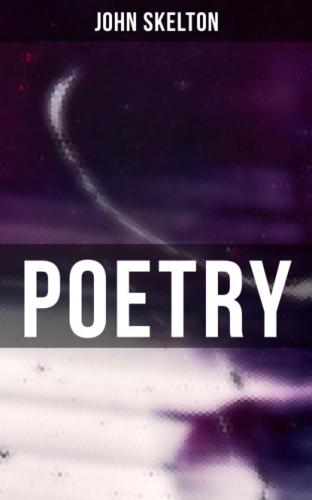Scogan and Skelton, 1600, a play by Richard Hathwaye and William Rankins, is mentioned in Henslowe’s MSS.: see Malone’s Shakespeare (by Boswell), iii. 324.
Notices of Skelton may also be found in:—
A Dialogue bothe pleasaunt and pietifull, wherein is a godlie regiment against the Feuer Pestilence, with a consolation and comforte againste death. Newlie corrected by William Bullein, the authour thereof. 1573, 8vo. Of this piece I have seen only the above ed.: but it appeared originally in 1564. It contains notices of several poets, introduced by way of interlude or diversion in the midst of a serious dialogue; and (at p. 17) Skelton is described as sitting “in the corner of a Piller, with a frostie bitten face, frownyng,” and “writyng many a sharpe Disticons” against Wolsey—
“How the Cardinall came of nought,
And his Prelacie solde and bought,” &c.
(15 verses chiefly made up from Skelton’s works).—The Rewarde of Wickednesse, discoursing the sundrye monstrous abuses of wicked and vngodly Wordelings, &c. Newly compiled by Richard Robinson, seruaunt in householde to the right honorable Earle of Shrewsbury, &c. 4to, n. d. (The Address to the Reader dated 1574), at sig. Q 2.—A Discourse of English Poetrie, &c., By William Webbe, Graduate, 1586, 4to, at sig. c iii.—The Arte of English Poesie, &c. (attributed to one Puttenham: but see D’Israeli’s Amen. of Lit. ii. 278, sqq.), 1589, 4to, at pp. 48, 50, 69.—Fovre Letters, and certaine Sonnets: Especially touching Robert Greene, &c. (by Gabriell Harvey), 1592, 4to, at p. 7.—Pierces Supererogation or a New Prayse of the Old Asse, &c. [by] Gabriell Haruey, 1593, 4to, at p. 75.—Palladis Tamia. Wits Treasvry Being the Second part of Wits Commonwealth. By Francis Meres, &c., 1598, 12mo, at p. 279.—Virgidemiarvm. The three last Bookes. Of byting Satyres (by Joseph Hall), 1598, 12mo, at p. 83.—The Downfall of Robert Earle of Huntington, Afterward called Robin Hood of merrie Sherwodde, &c. (by Anthony Munday), 1601, 4to. In this play, which is supposed to be a rehearsal previous to its performance before Henry the Eighth, Skelton acts the part of Friar Tuck.—In The Death of Robert, Earle of Hvntington, &c. (by Anthony Munday and Henry Chettle), 1601, 4to, which forms a Second Part to the drama just described, Skelton, though his name is not mentioned throughout it, is still supposed to act the Friar.—Miscellanea, written out by “Joħnes Mauritius” between 1604 and 1605—MS. Reg. 12. B. v.—contains (at fol. 14), and attributes to Skelton, a well-known indelicate jeu d’esprit.—Pimlyco, or Runne Red-Cap. Tis a mad world at Hogsdon, 1609, 4to. Besides a notice of Skelton, this poem contains two long quotations from his Elynour Rummyng.—Cornv-copiæ. Pasquils Night-Cap: Or Antidot for the Head-ache (by Samuel Rowlands), 1612, 4to, at sig. O 2 and sig. Q 3. The second notice of Skelton in this poem is as follows;
“And such a wondrous troupe the Hornpipe treads,
One cannot passe another for their heads,
That shortly we shall haue (as Skelton iests)
A greater sort of horned men than beasts:”
but I recollect nothing in his works to which the allusion can be applied.—An Halfe-pennyworth of Wit, in a Penny-worth of Paper. Or, The Hermites Tale. The third Impression. 1613, 4to. At p. 16 of this poem is a tale said to be “in Skeltons rime”—to which, however, it bears no resemblance.—The Shepheards Pipe (by Browne and Withers), 1614, 12mo, in Eglogue i., at sig. C 7.—Hypercritica; or A Rule of Judgment for writing, or reading our History’s, &c. By Edmund Bolton, Author of Nero Cæsar (published by Dr. Anthony Hall together with Nicolai Triveti Annalium Continuatio, &c.), 1722, 8vo, at p. 235. At what period Bolton wrote this treatise is uncertain: he probably completed it about 1618; see Haslewood’s Preface to Anc. Crit. Essays, &c. ii. xvi.—Poems: By Michael Drayton Esqvire, n. d. folio, at p. 283.—The Golden Fleece Diuided into three Parts, &c., by Orpheus Junior [Sir William Vaughan], 1626, 4to, at pp. 83, 88, 93, of the Third Part. In this piece “Scogin and Skelton” figure as “the chiefe Aduocates for the Dogrel Rimers by the procurement of Zoilus, Momus, and others of the Popish Sect.”—The Fortunate Isles, and their Union. Celebrated in a Masque designed for the Court, on the Twelfth-night, 1626, by Ben Jonson. In this masque are introduced “Skogan and Skelton, in like habits as they lived:” see Jonson’s Works, viii. ed. Gifford: see also his Tale of a Tub (licensed 1633), Works, vi. 231.—Wit and Fancy In a Maze. Or the Incomparable Champion of Love and Beautie. A Mock-Romance, &c. Written originally in the British Tongue, and made English by a person of much Honor. Si foret in terris rideret Democritus.[148] 1656, 12mo. In this romance (p. 101) we are told that “[In Elysium] the Brittish Bards (forsooth) were also ingaged in quarrel for Superiority; and who think you threw the Apple of Discord amongst them, but Ben Johnson, who had openly vaunted himself the first and best of English Poets … Skelton, Gower, and the Monk of Bury were at Daggers-drawing for Chawcer:” and a marginal note on “Skelton” informs us that he was “Henry 4. his Poet Lawreat, who wrote disguises for the young Princes”!
[148] Such is the title-page of the copy now before me: but some copies (see Restituta, iv. 196) are entitled Don Zara del Fogo, &c. 1656; and others Romancio-Mastix, or a Romance of Romances, &c. By Samuel Holland. Gent. 1660.
